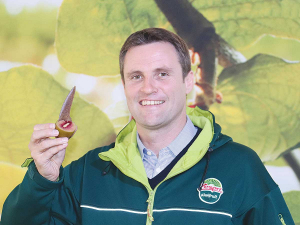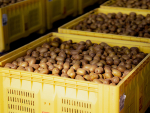Zespri returned almost $2 billion to New Zealand’s kiwifruit industry in the 2019/20 financial year.
The kiwifruit marketer’s 2019/20 financial results show total fruit and service payments, which are returns to the New Zealand industry, increased by 8% on the year prior $1.96 billion.
Zespri’s total operating revenue was $3.36 billion, up from $3.14 billion, with global revenue from fruit sales increasing by 7% to $3.14 billion.
This was based on the sale of 164.4 million trays of New Zealand and non-New Zealand-grown kiwifruit, a 2% reduction on the previous year.
Zespri made a net profit after tax of $200.8 million, up from $179.8 million in 2018/19.
The company’s board expects the total dividend for 2019/20 to be 94c/share, up slightly from 92c/share in 2018/19.
“Overall, 2019/20 was another strong year for Zespri with continued growth in our largest markets including Japan, Greater China and Europe,” says Zespri chief executive Dan Mathieson.
“On top of strong returns we achieved some real milestones last season including commercialising the new Zespri Red Kiwifruit variety, opening our new Head Office in Mount Maunganui, launching our new brand, announcing our sustainability targets and investing more than ever in communities,” he says.
Strong results across each fruit category
• The average Green per tray return increased to $6.67, with the average per hectare return for Green reaching a record high of $67,295.
• Organic Green reached an average return per tray of $9.88, with the average per hectare return reaching $63,734.
• The SunGold average return per tray increased to $11.86, and the average return per hectare was also a record $161,660.
• Sweet Green achieved an average return per tray of $7.66 and an average return per hectare of $43,550.
















